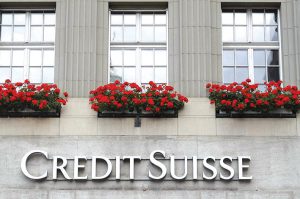Credit Suisse Group AG agreed to pay $234 million to settle a French criminal probe into allegations the bank helped clients stash undeclared funds.
The deal brings to an end the investigation into suspicions of laundering of tax fraud proceeds, top financial prosecutor Jean-Francois Bohnert said in court on Monday. Under the terms of the agreement, the Swiss bank makes no admission of guilt.
“It is an important moment for Switzerland’s banking history†and the relation of the country with the French tax authorities, Judge Stephane Noel said during the Paris hearing, after detailing the amounts and approving the resolution of the criminal allegations.
The settlement comes three days before a Credit Suisse strategy announcement aimed at putting an end to years of scandals and losses that have eroded investor confidence. Last week, the Swiss lender wrapped up some other investigations. It agreed to pay $495 million to resolve a case related to its sale of residential mortgage-backed securities and won a key class-action US lawsuit over allegations of price-fixing in the foreign-exchange market.
Credit Suisse said in a statement that it is “pleased to resolve this matter, which marks another important step in the proactive resolution of litigation and legacy issues.â€
French authorities have often resorted to settlements in recent years to end large probes and in June the PNF sealed a €1.25 billion deal with McDonald’s Corp. to end a tax case. Overall, the largest amount France collected in a criminal case comes from the Airbus SE case where the planemaker paid €2.1 billion in 2020.
The bank last week also won a key class-action US lawsuit over allegations of price-fixing in the foreign-exchange market, vindicating its decision to fight rather than settle a lawsuit that originally threatened it with as much as $19 billion in potential damages.
Monday’s case began in 2016 and hit headlines the following year with raids in five nations — France, Germany, the Netherlands, the UK and Australia.
—Bloomberg
 The Gulf Time Newspaper One of the finest business newspapers in the UAE brought to you by our professional writers and editors.
The Gulf Time Newspaper One of the finest business newspapers in the UAE brought to you by our professional writers and editors.
